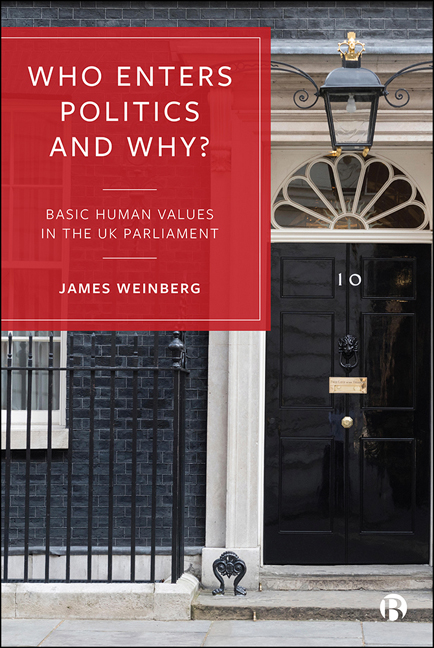Book contents
- Frontmatter
- Dedication
- Contents
- List of Figures and Tables
- Note on the Author
- Acknowledgements
- 1 Why Do We Hate Politicians?
- 2 Psychological Scrutiny: Who Enters Politics and Why?
- 3 All the Same! Demographic Homogeneity and Careerism
- 4 Basic Values and Partisanship
- 5 Parliamentary Behaviour: Personal Choices, Political Results
- 6 Perfect Politicians? Voting Preferences in the United Kingdom
- Notes
- Appendix A Twenty Item Portrait Values Questionnaire (TwIVI)
- Appendix B Confirmatory Factor Analysis of Survey data on the Basic Values of Politicians (UK Members of Parliament, N = 168)
- Appendix C External Correlations Across Samples
- Appendix D Conjoint Experiment of Candidate Preferences by Partisanship
- References
- Index
2 - Psychological Scrutiny: Who Enters Politics and Why?
Published online by Cambridge University Press: 12 March 2021
- Frontmatter
- Dedication
- Contents
- List of Figures and Tables
- Note on the Author
- Acknowledgements
- 1 Why Do We Hate Politicians?
- 2 Psychological Scrutiny: Who Enters Politics and Why?
- 3 All the Same! Demographic Homogeneity and Careerism
- 4 Basic Values and Partisanship
- 5 Parliamentary Behaviour: Personal Choices, Political Results
- 6 Perfect Politicians? Voting Preferences in the United Kingdom
- Notes
- Appendix A Twenty Item Portrait Values Questionnaire (TwIVI)
- Appendix B Confirmatory Factor Analysis of Survey data on the Basic Values of Politicians (UK Members of Parliament, N = 168)
- Appendix C External Correlations Across Samples
- Appendix D Conjoint Experiment of Candidate Preferences by Partisanship
- References
- Index
Summary
‘There are 650 people in Parliament and so with any group of 650, there is good and bad. There are people in Parliament I wouldn't trust as far as I could throw them and there are people in Parliament I would trust with my life.’
Conservative Party MP (Interviewee 17)Members of Parliament are unique among elite groups for their capacity to affect substantial political outcomes with far-reaching consequences locally, nationally and internationally. Even backbench MPs, who are often callously cast as party political lobby fodder, play an important role in moulding crucial policy decisions, in assuming the most influential roles in the state (either as a pool of potential recruits for the executive or by granting and withdrawing support for the government of the day), and in helping to design and reform the institutional nature of the state (see also Best and Vogel, 2018). However, existing studies of the UK Parliament and other legislatures around the world have only given limited attention to the individual, psychological characteristics of those actors who hold elected office and exercise these powers. Chapter 1 argued at some length that it is these ‘questions of character’ that actually underpin much of the anti-political sentiment, and thus democratic malaise, that academics and journalists have spent so much time discussing in recent years or even decades. As Allen and Cairney (2015, p 6) conclude, ‘many of the complaints put at the door of the ‘political class’ relate to Westminster politics and those with governing power or influence’. In attempting to fill this gap in our understanding of politicians, and in the public understanding of politics more broadly, this chapter analyses the Basic Human Values (Schwartz, 1992) of those individuals ‘in the arena’; as Theodore Roosevelt (1910) famously put it, those ‘who err, who come short again and again … but who do actually strive to do the deeds’.
Before turning to examine the basic values of our elected representatives, it is worth reiterating why exactly it matters who our politicians are. Contra to the broader questions of anti-politics discussed in Chapter 1, the focus here is on the concept and institutions of democratic representation and, more precisely, the transfer of power from principal to agent that it entails.
- Type
- Chapter
- Information
- Who Enters Politics and Why?Basic Human Values in the UK Parliament, pp. 25 - 52Publisher: Bristol University PressPrint publication year: 2020



